<Report from overseas office> [India] Ayurveda in Indian health and beauty market
- Release date: Jun 05, 2020
- 10538 Views
Ayurveda, recommended as a countermeasure against COVID-19
The number of cases of the new coronavirus is increasing in India, but Prime Minister Modi has been stressing the importance of improving immunity since he declared a lockdown. In India, where the number of doctors per capita is only about half that of Western countries and Japan(*1), the number and quality of medical facilities are inadequate, the government is focusing on how not to increase the number of patients. While eating a healthy diet of fresh vegetables is of course important, they also call for boosting immunity through the use of Ayurveda, an ancient Indian medicine. In India, there is a Ministry of Traditional Medicine called AYUSH (AYUSH is an acronym for Ayurveda, Yoga & Naturopathy, Unani (Unani medicine), Siddha (South Indian traditional medicine) and Homeopathy) , whose Facebook page describes Ayurveda remedies for strengthening the immune system.
When you hear the word "Ayurveda" in Japan, you probably think of massages and beauty treatments with herbal oils. Of course, there are treatments that specialize in beauty, but Ayurveda is based on Eastern medicine. Just like Chinese medicine, the emphasis is on the prevention of disease. For example, the AYUSH Ministry website recommends drinking white water, herbal tea with spices, golden milk (milk with turmeric), and a gargle using oil as a countermeasure against coronavirus. On the other hand, my Indian co-worker told me that people in India know that Ayurveda corona remedies are recommended by the AYUSH ministry, but most of them don't have enough time to do that in an appropriate manner. Although it's a well-known traditional remedy, it seems that it requires a certain amount of commitment when it comes to practicing it.
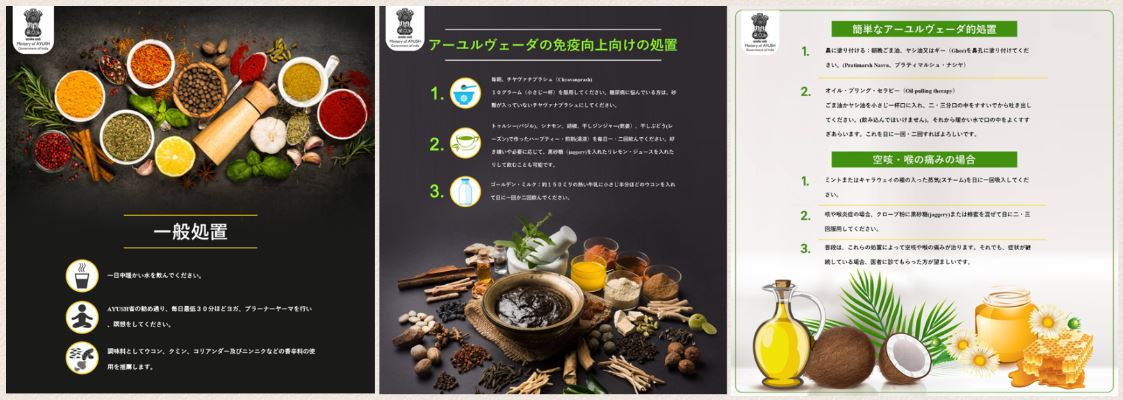
Source: Ministry of AYUSH's Facebook page
Growing preference for natural products
At present, India is one of the largest countries in terms of lifestyle-related diseases, with about 50 million people suffering from diabetes and about 20% of the population being obese. Indian food uses a large amount of oil when cooking and is heavily seasoned, so it is characterized by the fact that many of them are high in calories.
In addition, the Westernization of food and the spread of fast food have contributed to the high-calorie diet. In addition to three meals (breakfast, lunch and dinner), they often eat samosas and instant noodles in the evening as a light meal. They also take their evening meals late, such as around 10:00 p.m., and go to bed soon after eating. From a Japanese point of view, many of them seem to have an unhealthy lifestyle that can lead to obesity.
(A typical day for Indians: created from staff interviews)

You can also visit this link to see the daily life and houses of actual Indian consumers.
As lifestyle-related diseases have become a social issue, keywords such as obesity, high blood pressure, and diabetes are appearing more frequently in the media, leading to a growing health consciousness among consumers. On supermarket shelves, products promoted as “Sugar Free” or “Low Calorie” are increasingly common, and organic vegetables and fresh juices are now a familiar sight.
For example, at Nature’s Basket, a premium supermarket that also carries imported foods, fresh juice is sold using an in-store cold-press orange juicing machine. In addition, food delivery services are seeing a rise in restaurants offering healthy meals such as natural foods and salads.
In today’s India, a “natural-oriented” lifestyle is spreading among consumers not only in food-related areas but also in other aspects of daily life. For example, during the turmoil caused by the COVID-19 pandemic, one of the first products to become difficult to obtain was hand sanitizer from the brand Himalaya. Himalaya’s hand sanitizers are said to be gentle on the skin because they do not use chemical ingredients, and they were particularly sought after by women and households with children.
Ayurveda provides an added value in cosmetics
This preference for natural products can also be seen in cosmetics. For example, in Nykaa, the largest e-commerce site for cosmetic products, "Natural" is categorized as "Makeup" and "Personal Care" on the top page of the site. It offers a wide range of products, from imported brands priced in the tens of thousands of rupees to low-end products priced in the hundreds of rupees, and the number of products in the low-end range is particularly large. When it comes to skincare, some consumers use home remedies such as packets of fruits and vegetables, and there is a good background for natural cosmetics. In recent years, a variety of factors have caused skin irritation and problems, such as increased stress associated with women's social advancement and severe air pollution in urban areas. With this in mind, natural cosmetics that use natural ingredients and avoid preservatives and synthetic fragrances as much as possible are gaining in popularity. Natural cosmetics are not limited to women; you can also find products for men that use aloe or citrus ingredients in facial cleansers and toners.
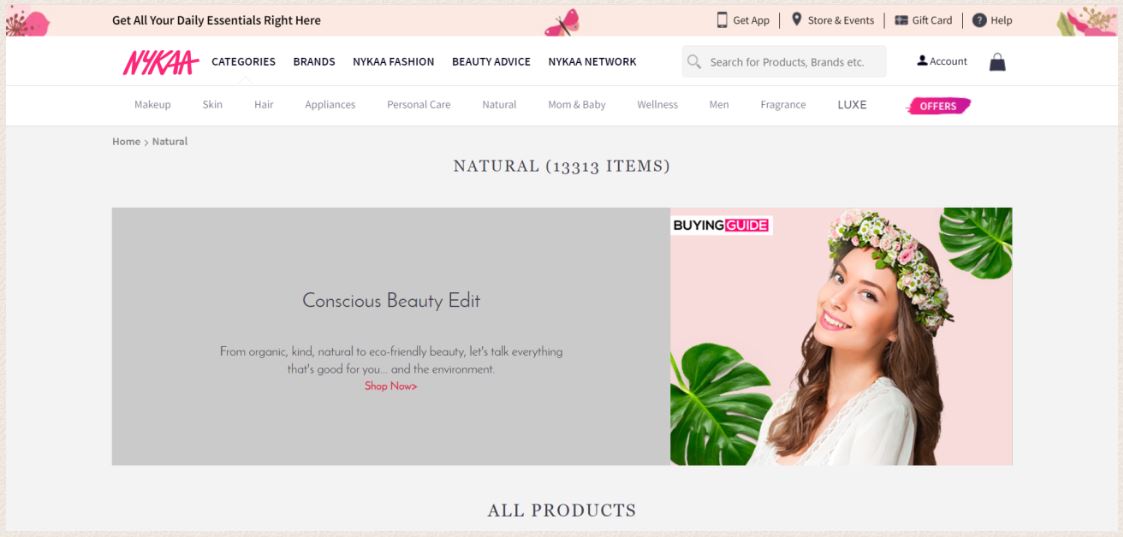
The largest cosmetics e-commerce Nykaa's website
Nykaa is recognized as an important shopping site and a source of product information
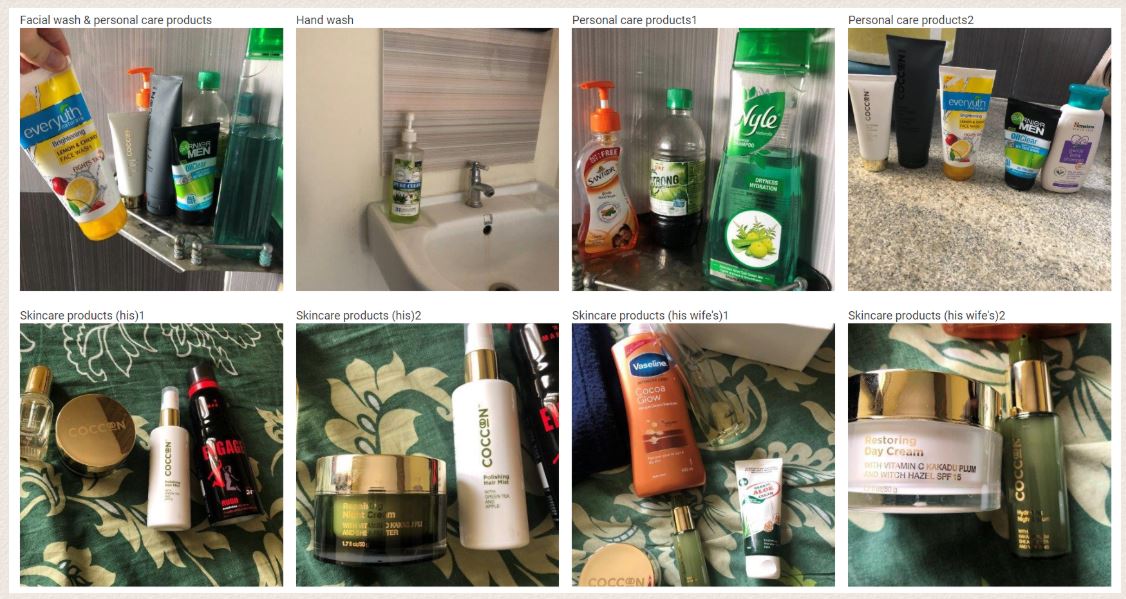
Source:Consumer Life Panorama Cosmetic and personal care products in the houses of consumers in Bangalore. They use many natural brands and products.
Natural cosmetics include Ayurveda cosmetics such as KAMA and Forest Essentials, and these brands are in a slightly more premium line than the mass price range and are mainly targeted at the wealthy. These stores are located in shopping malls and trendy markets and have a luxurious atmosphere inside. There are also a number of testers in the store, where you can purchase personal care products with the scent and ingredients of your choice. On the other hand, there are some cosmetic brands that are based on Ayurveda knowledge that can be found in supermarkets and even in town pharmacies, such as Biotique, Himalaya and Kahadi, which are available for tens to hundreds of rupees and are used by a wide range of women. In addition, some manufacturers that do not claim Ayurveda as a brand are selling Ayurveda-derived products as part of their higher-end lineups.
In Indian cosmetics and personal care products, natural is a must, and Ayurveda seems to be recognized as a value-added, differentiating factor of "natural + α".
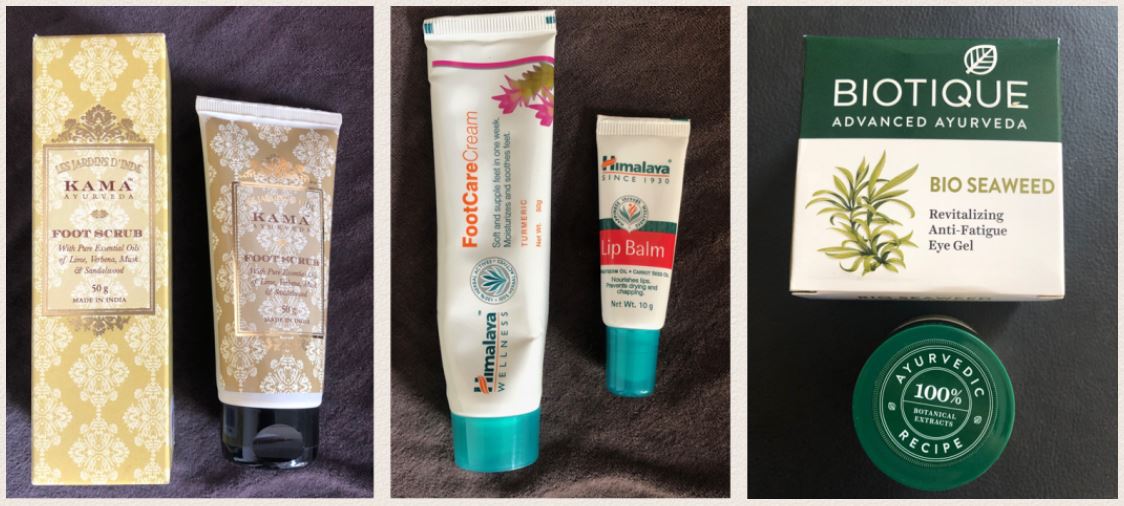
From left to right, KAMA, Himalaya and Biotique
Conclusion
Although we know that Ayurveda is good for our health, incorporating it into our daily lives can be a bit of a hurdle. On the other hand, in the future, in the era of “After Corona” or “With Corona”, consumers are expected to demand more immune-boosting foods and health products. If manufacturers offer Ayurveda elements like cosmetics, it will be easier for consumers to get their hands on these products. Already, Patanjali(*2) has grown to be one of the top FMCG brands with a diverse range of household products. In the future, we may see an increase in products that can be easily incorporated into daily life and followed authentic Ayurveda concepts, such as Ready to Eat products with Ayurveda recipes.

Link to Number of doctors per 1,000 population
*1 Number of doctors per 1,000 population
*2 Patanjali is an FMCG brand, of which the famous yoga guru is one of the founders. It also has a retail store.
-
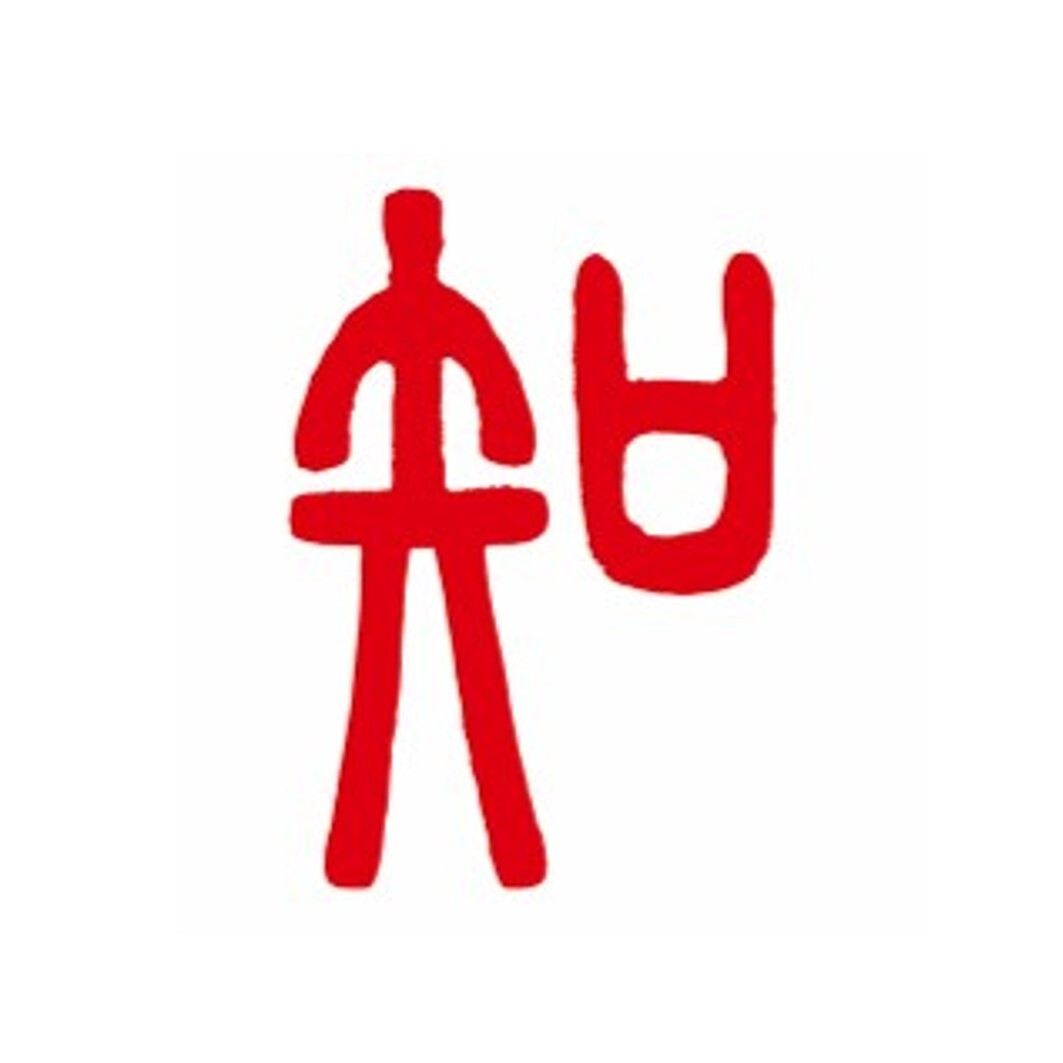
Author profile
Mr. Ryosuke Nakamura
A researcher living in India. I have worked in three cities in India; Mumbai, Delhi and Bangalore. I travel to rural and slum areas to understand the realities of the consumers behind the data.
-

Editor profile
Ms. Risa Takahama
I have been involved in global marketing research for consumer goods manufacturers, mainly in Asia, and is currently developing research solutions to guide the insights of overseas consumers. Whenever I travel abroad, I always stop at a drugstore to buy cosmetics that are unique to that country.
 Global Market Surfer
Global Market Surfer CLP
CLP